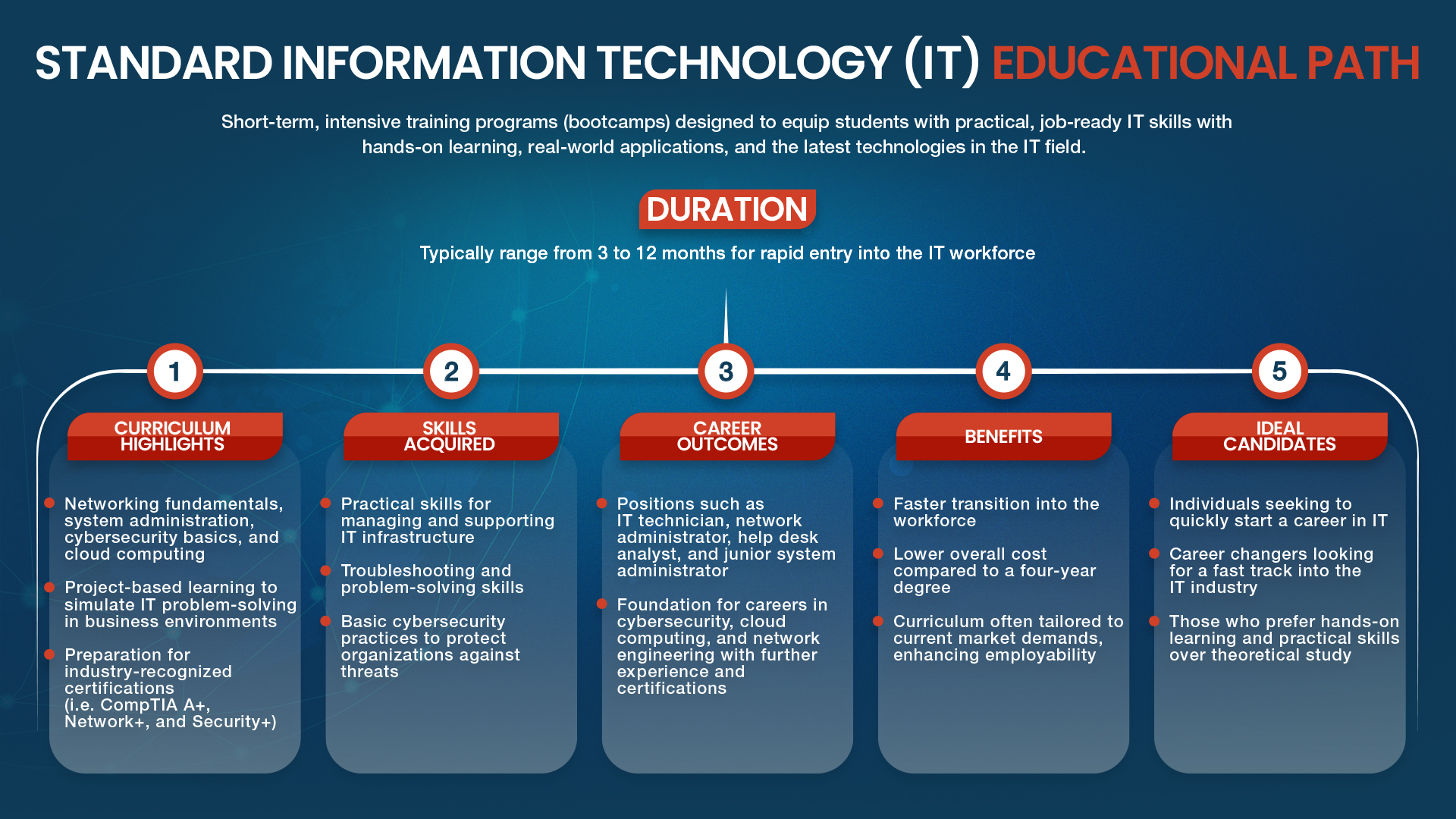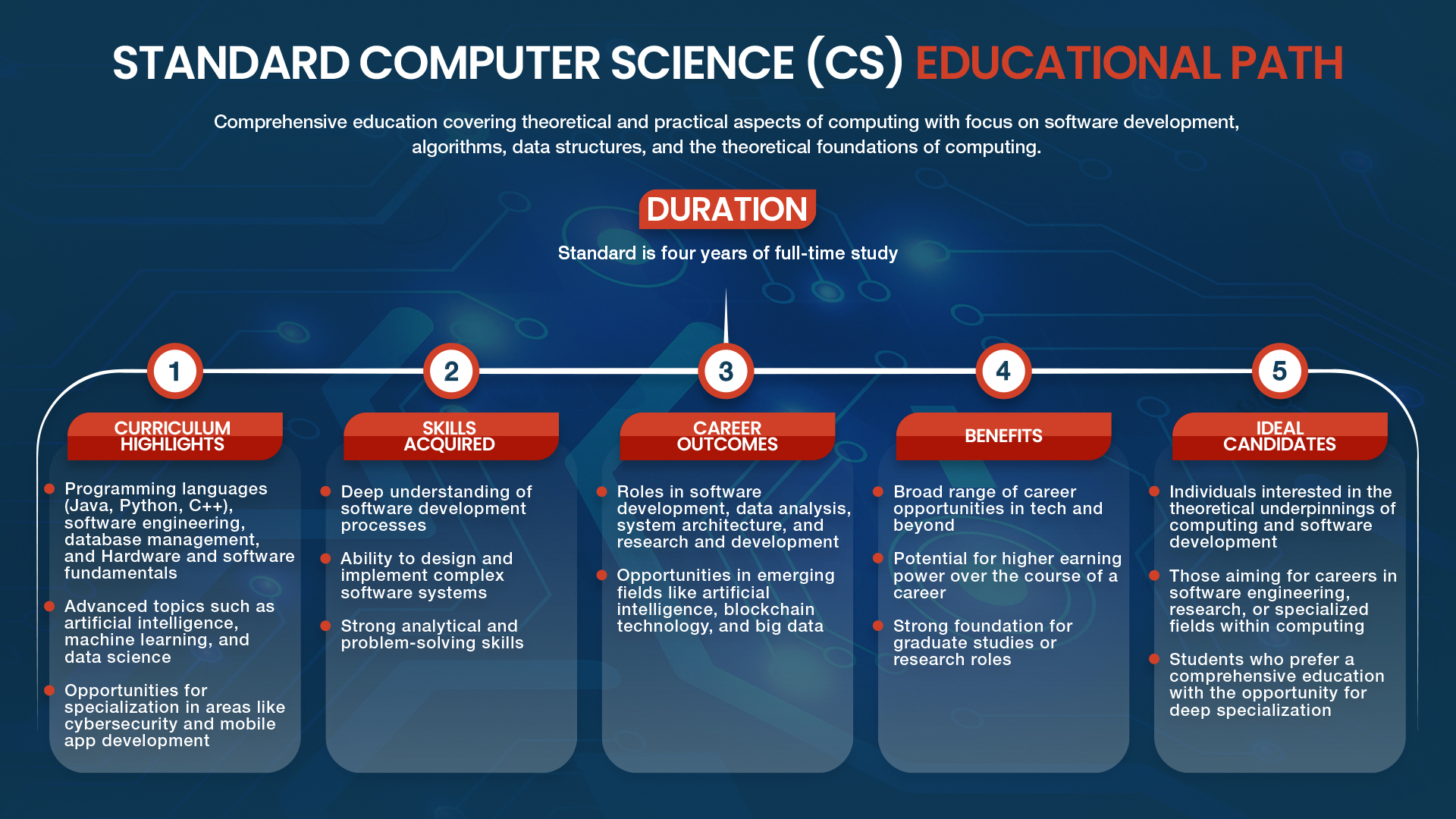
Information Technology vs. Computer Science: What's the Difference?
In a digital world, the demand for skilled digital professionals continues to grow (Remote). Between shifting digital workforces (Remote), prevailing talent gaps (Forbes), and remote work options(Forbes), both information technology (IT) and computer science (CS) have seen rapid expansion. Accelerated learning programs in cybersecurity, software engineering, cloud computing, and data analytics also create new opportunities for aspiring IT and CS professionals alike.
At first glance, IT and CS may seem like completely interchangeable terms, even interchangeable industries. After all, almost every successful industry today seems to rely on technology. However, both IT and CS are distinct fields, with unique roles in keeping organizations of all sizes productive, scalable, and secure.
Let’s explore the clear differences between information technology and computer science as they apply to most professional industries — and to your next career.
The Essence of Information Technology (IT)
Information technology is the strategic application and management of technology to meet the needs and objectives of businesses and organizations. Unlike computer science, which often delves into the theoretical underpinnings of computing, IT is deeply rooted in practicality and real-world problem-solving.
One of the fundamental aspects of IT is its focus on the infrastructure of technology. This includes a wide range of components, including the installation, maintenance, and enhancement of computer systems, network systems, and databases. IT professionals are responsible for ensuring that these systems operate efficiently and effectively, supporting the day-to-day operations of businesses and organizations.
Here’s how:
- Installation: IT professionals often handle hardware and software configuration and setup. These responsibilities can include deploying new servers, installing network devices, or implementing software applications, all crucial stages for laying the foundation of a robust IT infrastructure.
- Maintenance: Beyond initial setup, IT professionals play a critical role in the ongoing maintenance of technology systems. This involves monitoring performance, troubleshooting issues, applying software updates, and implementing security measures to safeguard against potential threats.
- Improvement: In addition to day-to-day maintenance, IT professionals also work to keep pace with evolving business needs and technological advancements. This may involve upgrading hardware components, optimizing software applications, or integrating new technologies to enhance efficiency and performance.
What sets information technology apart is its practical, problem-solving approach to addressing the diverse challenges faced by different organizations. IT professionals aren’t merely concerned with the theoretical aspects of technology; they are actively engaged in finding tangible solutions to real-world problems.
The Foundation of Computer Science (CS)
Computer science is the systematic study of algorithmic processes, computational machines, and computation. While this definition might feel more abstract than IT, that’s exactly the point. Computer science is a field wide enough to include the fundamental principles that govern computation and the development of computing technologies.
Unlike IT, computer science maintains a strong emphasis on theoretical foundations. It delves into the theoretical aspects of software development, algorithms, and the underlying principles that govern how computers operate at a deep level.
Here’s how:
- Software development: CS professionals are not just concerned with writing code; they work hard to understand the underlying principles of programming languages, software design patterns, and software architecture. This allows for robust, scalable, efficient software solutions that power everything from mobile applications to complex enterprise systems.
- Algorithms: Another key area of focus within CS is the study of algorithms, the step-by-step processes that demystify computational problems. Whether it's designing algorithms for sorting data, searching databases, or optimizing resource allocation, this ability to craft efficient algorithms is what powers CS as an industry.
- Deep-level computation: Beyond software development and algorithms, CS also requires a deep understanding of how computers operate. CS professionals study topics like computer architecture, operating systems, and networking protocols to gain insights into the underlying mechanisms that enable computation.
One of the hallmarks CS features is its focus on innovation, new tools, and computing technologies. CS professionals are at the forefront of technological advancement, constantly pushing the boundaries of what technology can accomplish through groundbreaking research and development.
Key Differences Between IT and CS
Navigating the vast landscape of IT and CS opportunities can feel daunting, particularly when you're considering a career in one field or the other. Understanding the key differences between these two fields is crucial for making informed decisions about your education and future career path.
Career Outlook
In the realm of information technology, professionals are responsible for managing and maintaining the technology infrastructure within organizations.
Here are some of the most promising entry-level IT roles to pursue:
- Cybersecurity analyst: Focuses on protecting organizational systems and data from cyber threats through the implementation of security measures and protocols.
- SOC analyst: Monitors the networks and servers to identify any security breach that can harm sensitive data as well as as analyze types of security threats.
- IT support specialist: Provides technical assistance and troubleshooting support to end-users, resolving hardware and software issues.
On the other hand, computer science professionals are typically engaged in the development of software, algorithms, and computing technologies.
Career paths in CS can include:
- Software developer: Designs, develops, and tests software applications and systems, leveraging programming languages and software development methodologies.
- Data scientist: Analyzes large datasets to extract insights and inform decision-making processes, utilizing statistical analysis and machine learning techniques.
- Systems architect: Designs and implements complex computing systems and architectures, ensuring scalability, reliability, and performance.
- Research scientist: Conducts research in areas such as artificial intelligence, computer vision, and cryptography, pushing the boundaries of technological innovation.
IT careers focus on managing and maintaining technology infrastructure within organizations, while CS careers center around developing software, algorithms, and computing technologies. Each demands a distinct skill set and offers unique work environment opportunities.
Skills and Interests
The skill sets and interests ideally suited for each field can vary significantly. In information technology, professionals often possess strong technical skills combined with excellent problem-solving abilities. They excel in environments that require hands-on troubleshooting and customer-oriented support. Interpersonal skills are also essential, as IT professionals often interact with end-users to understand and address their technology-related needs.
By contrast, computer science professionals typically possess strong analytical and problem-solving skills, coupled with a deep understanding of mathematical concepts and algorithms. They thrive in environments that value creativity, innovation, and theoretical thinking. Programming proficiency is a core skill for CS professionals, as they are often tasked with developing complex software solutions and algorithms.
Work Environment
Work environments for IT and CS professionals can vary depending on the nature of their roles and industries. In information technology, professionals are commonly found in corporate settings, supporting the technology infrastructure of businesses and organizations. This may involve working in-house within IT departments or providing outsourced IT services to clients.
On the other hand, computer science professionals often work in development labs, research institutions, or tech companies, where they are involved in the design and development of cutting-edge technologies. These environments are often characterized by collaborative teams, innovative projects, and a strong emphasis on research and development.
Standard Educational Path for IT

- Short-term, intensive training programs designed to equip students with practical, job-ready IT skills.
- Focus on hands-on learning, real-world applications, and the latest technologies in the IT field.
Duration:
- Typically range from 3 to 12 months, allowing for rapid entry into the IT workforce.
Curriculum Highlights:
- Networking fundamentals, system administration, cybersecurity basics, and cloud computing.
- Project-based learning to simulate IT problem-solving in business environments.
- Preparation for industry-recognized certifications such as CompTIA A+, Network+, and Security+.
Skills Acquired:
- Practical skills for managing and supporting IT infrastructure.
- Troubleshooting and problem-solving skills.
- Basic cybersecurity practices to protect organizations against threats.
Career Outcomes:
- Positions such as IT technician, network administrator, help desk analyst, and junior system administrator.
- Foundation for careers in cybersecurity, cloud computing, and network engineering with further experience and certifications.
Benefits:
- Faster transition into the workforce.
- Lower overall cost compared to a four-year degree.
- Curriculum often tailored to current market demands, enhancing employability.
Ideal Candidates:
- Individuals seeking to quickly start a career in IT.
- Career changers looking for a fast track into the IT industry.
- Those who prefer hands-on learning and practical skills over theoretical study.
Standard Educational Path for Computer Science

- Comprehensive education covering theoretical and practical aspects of computing.
- Focus on software development, algorithms, data structures, and the theoretical foundations of computing.
Duration:
- Standard duration of four years of full-time study.
Curriculum Highlights:
- Programming languages (Java, Python, C++), software engineering, database management, plus hardware and software fundamentals.
- Advanced topics such as artificial intelligence, machine learning, and data science.
- Opportunities for specialization in areas like cybersecurity and mobile app development.
Skills Acquired:
- Deep understanding of software development processes.
- Ability to design and implement complex software systems.
- Strong analytical and problem-solving skills.
Career Outcomes:
- Roles in software development, data analysis, system architecture, and research and development.
- Opportunities in emerging fields like artificial intelligence, blockchain technology, and big data.
Benefits:
- Broad range of career opportunities in tech and beyond.
- Potential for higher earning power over the course of a career.
- Strong foundation for graduate studies or research roles.
Ideal Candidates:
- Individuals interested in the theoretical underpinnings of computing and software development.
- Those aiming for careers in software engineering, research, or specialized fields within computing.
- Students who prefer a comprehensive education with the opportunity for deep specialization.
Choosing Between IT and CS
Deciding between a career in information technology or computer science isn’t an overnight process. It requires consideration and honesty about the skills you want to develop, the goals you’ve set for yourself, and the work environment where you’re most productive.
Here’s a quick guide to help with that decision:
1. Assess Your Interests and Strengths
Reflect on what aspects of technology excite you the most. If you enjoy hands-on problem-solving and thrive in dynamic, customer-facing environments, IT might be the right fit. But if you have a passion for programming, mathematics, and theoretical thinking, CS could be more aligned with your interests.
2. Consider Your Career Goals
Think about where you see yourself in the future and what kind of role you envision. If you want to be involved in software development, research, or cutting-edge technological innovation, a career in CS might be your next move. On the other hand, if you're interested in managing technology infrastructure, providing technical support, or specializing in cybersecurity, IT could be the better path for you.
3. Evaluate Your Preferred Work Environment
Consider the work environments that appeal to you. IT professionals often work in corporate settings, supporting the technology needs of businesses and organizations. If you enjoy collaborating with teams, solving practical challenges, and interacting with end-users, IT could offer a rewarding work environment. Conversely, CS professionals may find themselves in development labs, research institutions, or tech companies, where they have the opportunity to work on groundbreaking projects and contribute to technological innovation.
4. Embrace Continuous Learning and Certification
Regardless of whether you choose IT or CS, continuous learning is essential to stay current and advance in your career. Both IT and CS are constantly evolving, with new technologies, tools, and methodologies emerging regularly. Consider pursuing certifications in information technology, software development, or similar fields to keep your knowledge of IT and CS best practices up-to-date.
How QuickStart Can Help
If you're looking to embark on a career in information technology, QuickStart has served as an advocate in accelerated IT education for more than 35 years. We offer a wide variety of comprehensive certification programs, each tailored to help you earn the IT career you deserve. Whether you're interested in cybersecurity, cloud computing, or another IT specialization, QuickStart offers a range of courses to suit your interests and career goals.
Our certification programs not only validate your IT skills; they also set you apart from other candidates during any hiring process. These same certifications create valuable upskill opportunities for current IT professionals, whether you’re pursuing certification in Azure Fundamentals or Kubernetes.
Today is the day to invest in your own future, whether you're aiming to enhance your skills, transition to a new career, or embark on a fresh path. Connect with QuickStart today or call (855) 800-8240 for support in choosing your next step in tech.
